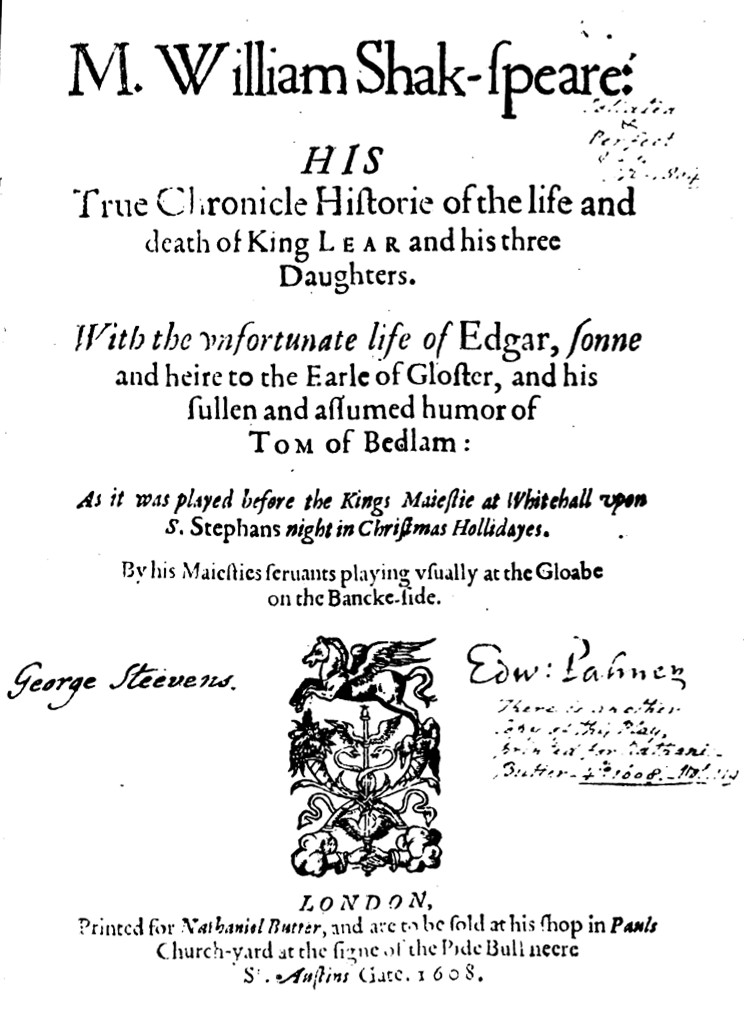Synopsis of "King Lear," Shakespeare's greatest tragedy.

William Shakespeare (1564-1616)Wikipedia.
King Lear" was written by Shakespeare around 1605.
I read "King Lear" translated by Tsunen Fukuda, Shinchosha.
Let's take a quick look at the synopsis.
Hey, I'm the king, you guys, you know that--.
Three beloved daughters, one good man. Who did the old king believe? The sisters who ran after their fortune and abandoned their father.
One of Shakespeare's four great tragedies.
When old King Lear abdicated, he decided to distribute his lands among his three daughters, with the greatest benefit to the most filial of the three. The two older sisters pleased their father with their clever and sweet words, but the truthful and frank words of his youngest daughter Cordelia enraged Lear, who disowned her and gave all his power and property to the two older sisters. The tragedy of old King Lear began then. ......
AmazonProducts Page.

The story begins with the folly of King Lear, who easily believed the sweet words of his two older sisters and was enraged by the frankness of his youngest daughter, who was the kindest of souls. King Lear, who until then had wielded his power as he wished, is no longer of any use and is treated with disdain as soon as he hands over his position and power to his two sisters.
From there, the plotting between the two sisters escalated into a major incident involving the entire country. King Lear is reduced to the status of a beggar, wandering the country. The fall from the peak of his power as king to a beggar with nothing, and the betrayal of his beloved daughter.
King Lear" is a work in which Lear's anguish and grief are depicted with overwhelming power.
I found a clear explanation in the solution at the end of the book, which I will quote here.
The theme of "King Lear" is, as is obvious to all, first and foremost about love and trust between parents and children. Lear and Gloucester are betrayed by the child they trust, while Cordelia and Edgar are betrayed by the father they love. Furthermore, obedience and falsehood overpower loyalty and justice, and Kent is banished.
The second theme of this work is renunciation of vanity. But this does not necessarily mean only pity for the poor. Lear says, "Don't speak of need! Even the lowliest beggar has something extra in his insignificant possessions.
The reason why Shakespeare, the realist, saw the human figure as pathetic was not because he was poor and therefore lacked something necessary, but because he was poor and still had something extra.
Now that he has been deprived of them and is alone, he sees that everything is a deception, and that "once you strip away the external attachments, all human beings are nothing more than poor, naked bipeds just like you.
Gloucester also rhymes with Lear, "There is no way for me to go, then I don't need eyes, I used to stumble when I could see. There are many examples of humans relying on what they have to make room for what they lose,卻That's what makes it strong," he said.
Even Edgar, the "naked biped" who was supposed to have taught Leah and Gloucester how to be human beings, muttered after seeing his father's miserable condition and being told that he still had something to lose,
Who can say, 'I'm at rock bottom, too? It is true that I am much more miserable now than I was before. But from tomorrow, I may be even more miserable.
Shinchosha, Tsunen Fukuda's translation of King Lear, p211-212
Some line breaks have been made.
The last line, "There is no such thing as rock bottom, as long as you can say to yourself, 'This is rock bottom.
The translator, Mr. Fukuda, praises the work as follows
King Lear" is Shakespeare's greatest tragedy. Not only that, but in this work, for the first time, Shakespeare has written a tragedy that bears his own unmistakable stamp, one that only he could have written.
When he wrote this, he had entered the heart of the world more deeply than any other tragic poet had ever been able to reach, and he saw before his eyes the collapse of its order and the ugly absurdity that would ensue.
Compared to this, even the best of Greek tragedy is overshadowed. Even in Aeschylus and Sophocles, behind the scenes, is not reason always dealing with the world of the gods, supported by a stability that always brings the balance of the ledger down to zero?
Shinchosha, Tsunen Fukuda's translation of King Lear, p210
Some line breaks have been made.
It is a masterpiece of tragedy that even overshadows Greek tragedy, according to Fukuda. So this work has that level of perfection. It is indeed the pinnacle of Shakespeare's tragedy.
Thoughts - From a Dostoevskyian Perspective
In this work, several people, including King Lear, suffer tragic fates. The tragedy of these people's lives is so horrific that we want to cover our eyes, and we are overwhelmed by their cries of grief.
However, Yasuo Nakamura's commentary at the end of the book stated the following.
King Lear" is a work to be feared. It awe-struck us and shakes the very foundations of our being. This is not only because of the cruel scene of Gloucester's blindness in the film, which ends with Lear dying along with Cordelia.
Evil, utterly inhumane evil, ricochets across our faces, and the absurdity of life is nakedly exposed. But there is "salvation" in this horrific tragedy. It is not merely a pessimistic work. (omitted).
The ultimate effect of this play is that pity and fear, pushed to the extreme heights of art, are skillfully combined with a sense of order and beauty, and we finally arrive at a consciousness of greatness in pain, not of gloom, much less despair, but of the majesty of a mystery we can never measure.
Shinchosha, Tsunen Fukuda's translation of King Lear, p225-226
This work is not merely a tragic pessimistic story. It is stated that it is in suffering that we find human greatness and immeasurable mystery.
There is salvation in suffering. This is something I feel is also true of Dostoevsky. For more on the connection between King Lear and Dostoevsky, see George Stainer'sTolstoy or Dostoevsky?"It was also preached in the
It seems to me that the greatness of this tragic work lies not merely in the fact that suffering becomes despair, but also in the fact that it looks at the depths of the human condition.
Finally, a few words about this work and the episode with that great Russian writer, Tolstoy.
For me, this episode was quite a surprise.
Tolstoy disliked Shakespeare and said that "The Original Lear" was far superior to his "King Lear. First of all, in his eyes, the subplots were superfluous and obscure the subject matter of the main plot.
Second, Lear's passion was unnatural, and his dialogue with the clown could only be considered a prank. But Tolstoy's end, when he ridiculed Lear for running around in the heath-covered wilderness, was perhaps more like Lear's than anyone else's. Lear looked "foolish" because he had the same "foolishness" as Lear. But Tolstoy, whose dramaturgy looked like the folly of Shakespeare, is merely a serious modern novelist.
Shinchosha, Tsunen Fukuda's translation of King Lear, p212
According to the translator Fukuda, Tolstoy disliked Shakespeare's works.
Why Tolstoy disliked Shakespeare is a very interesting subject, although I will be reading Tolstoy later and will consider this again at that time.
*Addition on July 26, 2022
Tolstoy'sShakespeare and Theatre Theory.finally read the book.
We will take a closer look at why Tolstoy disliked Shakespeare, especially "King Lear," in this article, so please take a look here.
The above is a synopsis of Shakespeare's "King Lear" - The world's greatest masterpiece of tragedy! Who can say, "I'm at rock bottom, too? Who can say, 'I'm at rock bottom, too'?
Next Article.
Click here to read the previous article.
Click here for a list of recommended Shakespeare works.
Related Articles





































